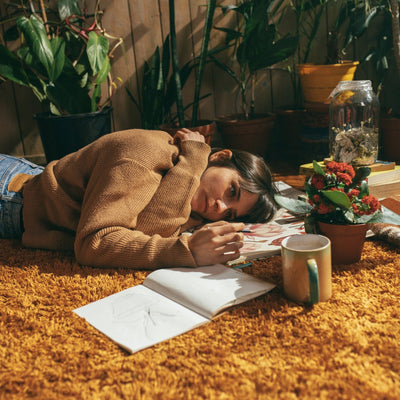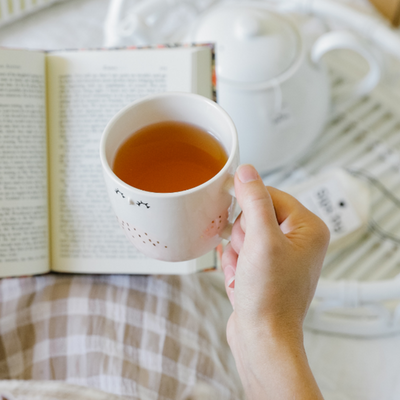Do you ever feel like you can’t drink coffee without getting jitters? If so, you may have a caffeine sensitivity.
If you need to cut back on caffeine, you shouldn’t have to cut back on tea. Let’s learn more about caffeine sensitivity and our favorite caffeine-free teas.
Sips by is the #1 rated tea club. Made by tea lovers for tea lovers, our personalized tea discovery box matches you with 4 new premium teas chosen from thousands of top-rated teas based on your unique taste preferences. Learn more about our tea of the month club.
How Does Caffeine Work?
Caffeine is pretty well-known for its energy-boosting effects. While you may feel more physically alert after drinking a cup of coffee or tea, caffeine actually works in your brain at a chemical level.
From the moment you wake up, a helpful enzyme in your brain called adenosine starts to build up. Adenosine is a depressant, which means it helps you stay calm and relaxed. As adenosine builds up throughout the day, you should start to feel more tired.
However, caffeine interrupts this process. Caffeine’s chemical structure is similar to adenosine’s structure, so it can bind to your adenosine receptors. With caffeine taking up all the receptor bays, adenosine can’t communicate with your brain. Therefore, you’re less likely to feel its sleep-inducing effects.
Caffeine blocks adenosine, but it also increases brain activity since it’s a stimulant. This is what causes you to feel focused and awake.
What Is Caffeine Sensitivity?
Caffeine can be a helpful tool. After all, many people drink caffeinated teas and coffee to get a mid-afternoon energy boost. However, some people may be a little more sensitive to caffeine than others.
Average Sensitivity
If you have an average level of caffeine sensitivity, then you may be able to drink between 200 mg and 400 mg of caffeine daily without issue. This is roughly equivalent to two to four eight-ounce cups of coffee or four to eight cups of black tea.
Those with average caffeine sensitivity should usually still feel tired at the end of the day, provided that they’ve consumed an appropriate amount of caffeine early enough in the day. This is a great sign that your body is able to process caffeine without issue.
Hyposensitivity
Hyposensitivity mainly refers to those who have incredibly fast metabolisms. These tea or espresso drinkers often metabolize caffeine so quickly that it doesn’t have a chance to really take effect.
In this case, caffeine lovers might need to drink large amounts of caffeine in order to get any kind of effect from the stimulating drug. They can also typically sleep well regardless of when they last had caffeine.
Hypersensitivity
Those with caffeine hypersensitivity react to even small amounts of caffeine. People in this group can experience symptoms of caffeine overdose, which include jitters, headaches, and feelings of stress, even after just one cup of coffee.
Those with caffeine hypersensitivity may also take much longer to metabolize caffeine, which means that caffeine stays in the system for longer. This can cause issues for these tea drinkers’ sleep habits, no matter when they last drank coffee.
4 Signs You Might Have Caffeine Hyper-Sensitivity
If you are sensitive to caffeine, you may experience some mental and physical discomfort soon after drinking your first cup of coffee or tea. Follow along to see if you might be a little more sensitive to caffeine.
Feelings of Stress and Tension
Those with caffeine sensitivity often feel anxious and stressed. This is because caffeine represses adenosine, that calming and relaxing chemical.
Instead, caffeine stimulates your brain, which can cause a rapid heartbeat and other physical symptoms of stress. This can manifest in many different ways, but some of the most common are being unable to sit still and stressful thoughts.
Caffeine Jitters
Similar to feelings of anxiety, caffeine overdose can make you feel jittery. This is because extra caffeine can cause your movements to get a bit unsteady.
Caffeine jitters can also cause you to have trouble sitting still, and you’ll likely feel like your whole body is revving to go. This sensation can be unpleasant, but it’s just the caffeine working its way through your system. Coffee is more likely to cause these jittery feelings than tea because the caffeine in tea is absorbed into your body more slowly for a sustained energy boost.
Trouble Sleeping
Those who are hypersensitive to caffeine can actually metabolize caffeine in their system twice as slowly as normal. This means that no matter how early in the morning you drink coffee, you might still have trouble sleeping.
Next time you can’t go to sleep, think about the last time that you drank a caffeinated beverage. While we recommend getting personal medical advice from your primary care physician, it’s possible that you may have a caffeine sensitivity.
Physical Discomfort
All of these jitters and all of the stress can combine to create some pretty uncomfortable physical symptoms. If you’ve had too much caffeine, you’re just as likely to feel it in your body as you are in your head.
Caffeine overdose can lead to an upset stomach and uncomfortable head and neck tension due to an overloaded central nervous system. You might feel nauseous, weak, and even dizzy.
If you experience severe discomfort or any chest pain, it’s incredibly important to seek emergency help right away. These symptoms can indicate a severe caffeine overdose, which can lead to serious health complications.
What Are the Maximum Recommended Doses of Caffeine?
Experts agree that you should consume no more than 200 to 400 mg of caffeine per day. Here’s how this translates in different caffeinated beverages:
Brewed coffee – Two to four cups per day
Espresso – Three to six shots per day
Black tea – Four to eight cups per day
Green tea – Seven to fourteen cups per day
Matcha – Two to four cups per day
Energy drink – Two to four cans per day
If you exceed the maximum daily recommended caffeine intake, you’re more likely to experience the negative side effects of caffeine. Caffeine consumption can be helpful, but it can quickly become unhelpful in large quantities.
Of course, these numbers mainly apply to those with normal sensitivities. If you are hypersensitive to caffeine, then you may not be able to even reach the low end of the daily spectrum before you experience symptoms of overdose.
Caffeine-Free Teas We Love
If you are hypersensitive to caffeine, we recommend switching to tea. Tea has less caffeine than coffee and contains an amino acid called L-theanine which helps you experience a slower and more sustained energy boost.
If you just want to avoid unpleasant caffeine effects by lessening your caffeine intake, you can try black tea or green tea. However, we recommend the following teas for anyone looking to truly reduce their caffeine intake.
While any tea from the Camellia sinensis plant will contain caffeine (AKA, “true” teas like black, green, oolong, and white teas), tea-like drinks made from other plants, fruits, herbs, flowers, and spices (such as herbal teas and rooibos) can be truly caffeine-free.
Rooibos
Rooibos is a decaf tea that grows in South Africa. As we mentioned above, rooibos is technically an herbal “tea,” since it isn’t made from the leaves of the Camellia sinensis plant. However, it has a rich flavor that makes it a popular substitute for black tea.
Although rooibos tea can come in many variants, one of our favorites is our Rooibos Earl Grey. This Sips By original blend features rooibos tea leaves and cornflowers for a smooth and delicious blend.
-
 Sold out
Sold out -
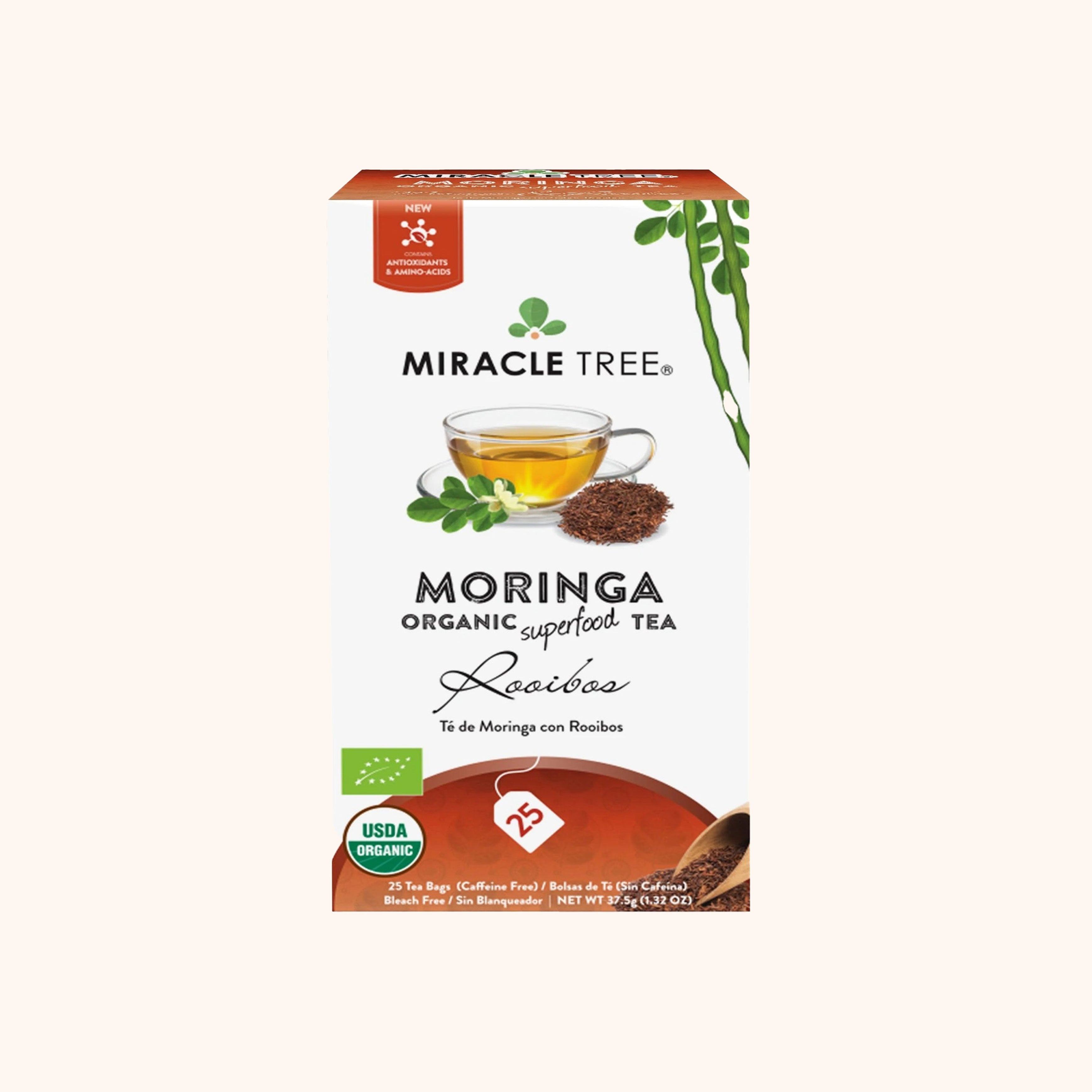 Sold out
Sold out -
 Sold out
Sold out
Fruit Tea
Fruit tea is naturally caffeine-free because it’s a type of herbal tea, but it’s also naturally delicious! These teas typically contain tart fruit pieces with sweet sugar or honey for a deliciously caffeine-free experience.
We love Tea Fiori Venetian Rose Peach Bellini, since it’s light and fruity while also having a slight floral tang.
-
 Sold out
Sold out -
 Sold out
Sold out -
 Sold out
Sold out
Chamomile
If you aren’t getting enough sleep due to caffeine, we recommend drinking chamomile tea. This herbal tea is made from the chamomile plant, which grows naturally in Europe.
Chamomile is an old folk remedy for sleeplessness and an upset stomach, and science has proven some of these tales of medicinal qualities to be true. This tea may help ease your brain and body back down to normal activity levels as you cut out sources of caffeine.
One of our favorite chamomiles is Healthify Tea Calming Tea. With chamomile, moringa, and rose petals, this delicious nighttime tea might be just what you need to calm your feelings of anxiety.
-
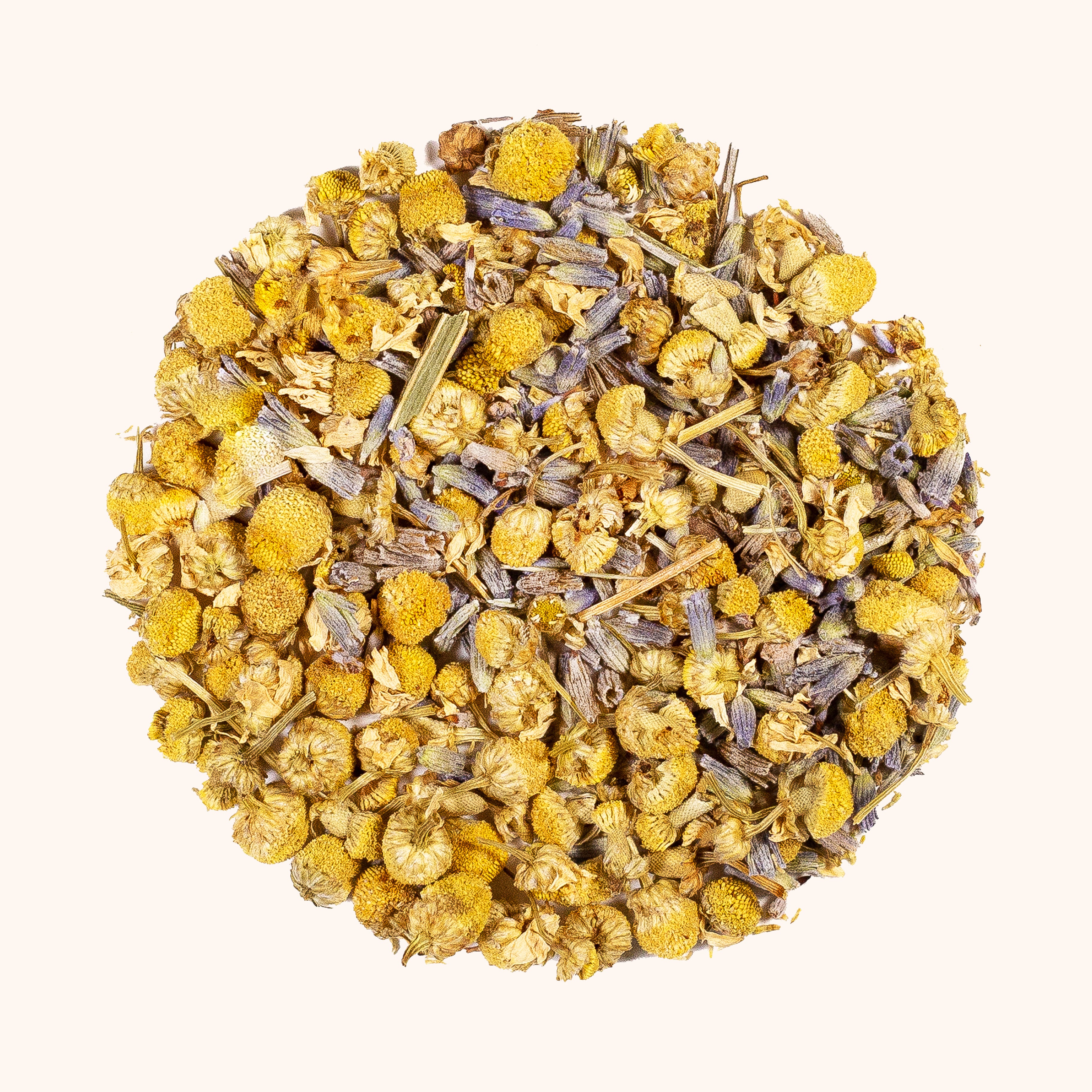 Sold out
Sold out -
 Sold out
Sold out -
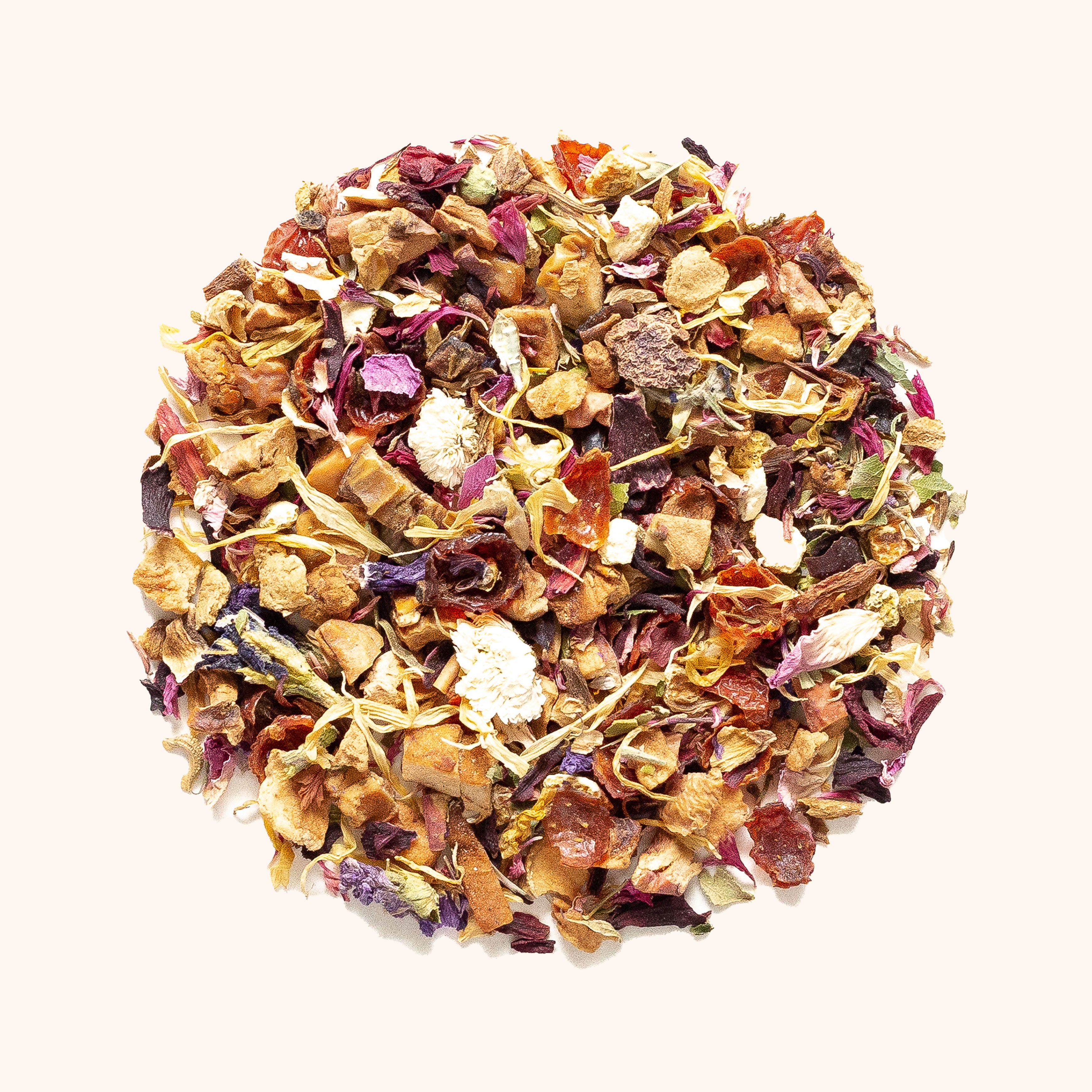 Sold out
Sold out
Summing It Up
If you experience physical discomfort and jitters after drinking your morning cup of coffee, you may be hypersensitive to caffeine. Although this can be uncomfortable, sometimes lowering coffee consumption and switching to tea can help.
We recommend caffeine-free blends that are designed with relaxation in mind since those beloved coffee beans can increase your heart rate and leave you feeling stressed. For more tea tips, check out our blog and follow us on social media!
Herbal Tea Shop
Herbal tea is naturally caffeine-free and has many health benefits. No matter the type or flavor of herbal tea you're searching for, Sips by has options you'll love. Discover your new favorite herbal caffeine-free tea today!

Interested in trying these teas and others? Subscribers receive 4 teas chosen just for them in every box. Learn more about our tea subscription box or explore the loose leaf tea shop.
About Sips by: We’re a female-founded and led startup that makes discovering tea fun, personalized, and affordable. The Sips by Box is the only multi-brand, personalized tea subscription box. Each month, we match tea drinkers across the U.S. with delicious teas from over 150 global tea brands that we’re sure they’ll love. Based out of Austin, Texas, we are adept at savoring a hot mug even when it’s seasonally inappropriate.
Sources:
Open for Discussion: Caffeine | American Chemical Society
Caffeine Content for Coffee, Ttea, Soda and More | Mayo Clinic
Caffeine Sensitivity | Caffeine Informer
Spilling the Beans: How Much Caffeine is Too Much? | Food and Drug Administration (FDA)










